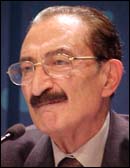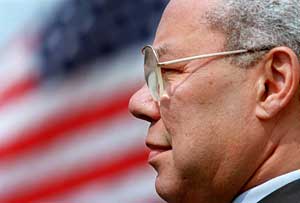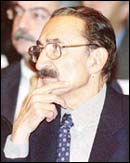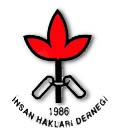2
March 2001
![]()
2. "Turkish Crisis Weakens Case
for Intervention", among all the occasions that the International
Monetary Fund has gotten egg on its face, last week's financial crisis
in Turkey came at an especially awkward time.
3. "Kurdish parties: The reason for the migration
is oppression", Representatives from the Kurdistan Workers'
Party (PKK), Kurdistan Democrat Party (KDP), Patriotic Union of Kurdistan
(PUK), Iranian Kurdistan Democrat Party (IKDP), and Kurdistan Socialist
Party (PSK) participated in a press conference held by the French Greens
Party.
4. "US warns Turkey", the United States
has warned Turkey not to violate the United Nations sanctions against
Iraq.
5. "Ecevit urged to forge rescue package",
the Turkish Prime Minister is coming under pressure to shape a new economic
policy before markets close for a holiday week.
6. "Balances that changed after 1990 and Turkey",
the years that followed 1989 made their mark on striking changing changes
to this world. The break up of the Soviet Union and the bipolar world
of the Cold War era was replaced by the search for new balances.
7. "Anter claims Tanis and Deniz are alive",
People's Democracy Party (HADEP) council member Dicle Anter, who is
in Silopi for one month for the investigation of the disappearance HADEP's
Silopi Branch Chairman Serdar Tanis and its secretary Ebubekir Deniz,
talked to the Turkish Daily News and said that according to information
they had obtained, Tanis and Deniz are alive and being kept under custody.
Anter said they were hopeful that Tanis and Deniz would be set free.
8. "Human Rights Agenda: F-type prisons and land
mines", the Human Rights Association (IHD) members, who
reiterated its demands for the improvement of the conditions in F-type
prisons, calls on the government to take measures against land mines.
1. - The Guardian - "Turkey brings in experts":
ISTANBUL / by Chris Morris
The main opposition party in the Turkish parliament filed a censure
motion against the government yesterday, accusing it of bringing the
economy to the brink of collapse.
With markets struggling to recover from a week of financial upheaval
sparked by a row between the prime minister, Bulent Ecevit, and the
president about the pace of corruption investigations, Mr Ecevit, has
said he is seeking billions of pounds in new international loans.
A senior Turkish economist from the World Bank, Kemal Dervis, arrived
in Ankara yesterday at the request of Mr Ecevit. Mr Dervis is expected
to become a pivotal figure in a new economic team designed to restore
the confidence of sceptical investors. Two teams from the International
Monetary Fund are also locked in talks with the government.
Large parts of the economy have ground to a halt, with some companies
not paying wages because they are short of hard cash, and others laying
off staff. Banks have frozen loans and many small businesses are stretched
to the limit.
A group of leading unions and business organisations has threatened
widespread popular protests after next week's Eid holiday if they are
not consulted about economic policy. ![]()
2. - The Washington Post - "Turkish Crisis Weakens Case for Intervention":
By Paul Blustein
Among all the occasions that the International Monetary
Fund has gotten egg on its face, last week's financial crisis in Turkey
came at an especially awkward time.
The Bush administration's economic team is just settling in, and some
of its top policymakers are plainly skeptical about the wisdom of the
large IMF-led bailouts that were supported by the United States, the
fund's dominant member, during the Clinton administration.
How inopportune for the IMF, therefore, that its rescue for Turkey should
go awry at such a delicate political moment.
Financial turmoil forced the Turkish government last Thursday to give
up defending its currency, the lira, which has since lost about a quarter
of its value against the U.S. dollar. The decision to let the lira's
value fall came only two months after the IMF approved a $11.4 billion
loan package aimed at enabling Ankara to keep the lira pegged to the
dollar and the euro.
That series of events hardly helped the IMF's standing with Treasury
Secretary Paul H. O'Neill, who said in an interview before the lira's
devaluation that when it comes to coping with financial crises, "I
like success. I'm not a fan of even well-meaning failure."
O'Neill has questioned why the IMF failed to anticipate financial disasters
in Russia, Indonesia and elsewhere, and colleagues say he is making
similarly pointed queries about why the fund backed Turkey's currency
peg.
"The writing was pretty much on the wall," a Treasury official
said of Turkey's decision to allow the lira to fluctuate in accord with
market forces. "It was going to happen sooner or later. And when
we know something's going to happen, we ought to get ahead of it, and
hopefully it will be a little less disruptive."
Not that anybody could have predicted the spat between Turkey's president
and prime minister that burst into public view on Feb. 19 and triggered
a massive withdrawal from Turkish markets by investors and lenders.
That episode, which aroused fears that Turkey's shaky coalition government
would fall apart, was followed three days later by the floating of the
lira.
But IMF officials themselves concede that they were taking a big gamble
by helping prop up the currency of a country with deep-rooted economic
and political weaknesses. The fund gave Turkey a three-year, $4 billion
loan at the end of 1999, and another $7.5 billion emergency loan in
December 2000 when the lira came under assault. At the time, "there
were strongly held different views, within the institution and among
the staff, about how to proceed," said John Boorman, director of
the fund's Policy Development and Review Department.
The dilemma they confronted was a tough one, fund officials said, and
it helps illuminate why "well-meaning failures" can be hard
to avoid for the world's financial firefighter.
Pegged currencies have collapsed in one emerging-market crisis after
another -- Mexico's, Thailand's, Indonesia's, Russia's and Brazil's.
They have fallen into such ill repute in economic circles that in 1999,
the IMF decided that from then on, it would refrain from lending to
support them, except under limited circumstances.
But the Turkish government insisted on keeping its loosely pegged system
when it negotiated its IMF loan, even late last year when currency speculators
began betting heavily that the regime would implode. "The fund
and the [U.S.] Treasury wanted Turkey to get off the peg in November
[2000], but the Turks steadfastly refused to do so," said Dani
Rodrik, a Harvard professor with U.S. and Turkish citizenship who has
been advising the Turkish central bank.
After a heated internal debate, the IMF decided that it couldn't turn
down Turkey's request for aid. Turkey is a linchpin of the NATO alliance,
and a key U.S. ally in the Middle East, but even apart from such geopolitical
considerations top fund officials concluded that there was a reasonable
economic case for going along with Ankara.
The motivation for keeping the currency peg was one that the disciplinarian
IMF could sympathize with: Turkey wanted to cure its most fundamental
and long-standing problem, an inflation rate that was in triple digits
as recently as 1999. Holding the lira's value steady against the dollar
and euro was supposed to force the government to refrain from an inflationary
expansion of the money supply.
The Turks agreed to cut the government budget deficit and take other
painful measures needed to stabilize prices for the long term. Furthermore,
Ankara agreed, at fund insistence, to an "exit strategy" for
the currency peg, under which the lira would start fluctuating in a
wider range in mid-2001.
"Given that the Turkish authorities had committed themselves to
that, and given that it was their very strong preference to continue
[with the peg], we decided to offer support," Boorman said. The
IMF has learned through bitter experience that its programs tend to
work poorly when it crams all of the conditions down a government's
throat, he said. "One of the things we've recognized much more
forcefully over the last few years is the importance of 'ownership'
by the authorities of their programs."
But success depended on near-perfect performance by Turkey in sustaining
market confidence, a standard that it could not meet.
Meanwhile, IMF officials are doing their best to show that they are
addressing one of O'Neill's main concerns -- the need for better fund
"surveillance" that would foresee crises and prevent them.
IMF Managing Director Horst Kohler yesterday explained his decision
to create a new International Capital Markets Department, as recommended
by a task force. The new department will incorporate existing operations
that are now spread among three departments, and its purpose will be
"to define a clear focus" for the fund in improving its "early
warning" capacities and "strengthen the fund's role in crisis
prevention," Kohler said. ![]()
3. - Ozgur Politika - "Kurdish parties: The reason
for the migration is oppression":
Representatives from the Kurdistan Workers' Party (PKK), Kurdistan
Democrat Party (KDP), Patriotic Union of Kurdistan (PUK), Iranian Kurdistan
Democrat Party (IKDP), and Kurdistan Socialist Party (PSK) participated
in a press conference held by the French Greens Party. The conference
pointed out that the reason for migration from Kurdistan is oppression
and conflict.
PARIS / Huseyin Turhalli
Kurdish parties meeting under the initiative of the French Greens Party held a joint press conference on the subject of migration from Kurdistan to Europe.
Representatives from the PKK, KDP, PUK, IKDP, and PSK participated in the conference, which began the other day at 11:00 at the Greens Party central headquarters in the Parmantier district of Paris. The Greens were represented by Francine Bavay, while Faruk Dogru spoke on behalf of the PKK, Seyvan Barzani on behalf of the KDP, Ahmet Bamerni for the PUK, Aka Gunduz for the PSD, and Khosrav Abdullahi for the IKDP.
The Kurdish problem has hit the shores of Europe
Greens representative Bavay spoke first at the conference, in which the French media showed great interest. Bavay said that the Kurdish problem had hit the shores of Europe with the last incident of mass migration, and said, "We support the right of the Kurds to self-determination, just as we do for every other people." Bavay said that they also wanted the ban against the PKK that was implemented in 1993 to be lifted, adding, "We will take initiatives to form a working group comprised of all the parties which have groups in the French Parliament to debate the problems of the Kurds in a broader framework and to find a political solution."
Migration is a part of ethnic cleansing
PKK representative Faruk Dogru said that the policy of forced migration of the Kurds was part of a long-term ethnic cleansing policy of the dominant states, and noted that these states, foremost Turkey, had organized the latest migration tragedy. "How could it be that 1,300 Kurds leave from Shengal, which is under Saddam's control, enter Turkey, stay there for weeks, and yet not even one person is captured?" Dogru asked, continuing to say: "There is clearly an ethnic cleansing strategy and Europe, which gives Turkey military, political, and economic support, has been included in it. The European Union countries must show the necessary sensitivity for a peaceful solution to the Kurdish problem, which has been carried as far as Europe."
KDP representative Seyvan Barzani, for his part, said that Kurds migrated because they could not tolerate the severe repression from Saddam and because their lives were not secure.
The reason is not economic
PUK representative Bamerni had the following to say: "There are no economic reasons for the migration. The people subjected to massacres and tragedies are forced to migrate to seek security." Bamerni added that it was necessary to find a solution to these problems in order to stop the migration.
The press conference ended with a call for the EU countries
to arrange a conference to find a peaceful political solution to the
Kurdish question. ![]()
4. - Kurdish Observer - "US warns Turkey":
The United States has warned Turkey not to violate the United Nations
sanctions against Iraq. A top-level US official who did not wish to
have his name revealed said that US Secretary of State Colin Powell
had called on Turkey "not to violate the sanctions against Iraq,
as in the example of Syria" when he spoke in Brussels with Turkish
Foreign Minister Ismail Cem. Deep differences in Iraqi policy have developed
between Turkey and its US ally.
BRUSSELS 
The officials said that Powell had met with Syrian President Bashar
al-Assad, where the two reached agreement on the subject of UN control
of the Iraq-Syria oil pipeline and that they expected the same attitude
from Turkey.
It was asserted that the US also wants Turkey to allow the UN to control the Kirkuk-Yumurtalik pipeline, and that US Assistant Secretary of State Edward Walker would be arriving in Ankara on Thursday to forward this request.
It is expected that Walker will discuss such matters as the policy that the new US administration will follow for the region, the last operation against Iraq, and the Middle East peace process during his contacts in Ankara.
US Secretary of State Powell said during his visit to
Brussels that UN control of the oil pipelines would give the opportunity
to better supervise Iraq's oil exports. ![]()
5. - AP - "Ecevit urged to forge rescue package":
ANKARA
The Turkish Prime Minister is coming under pressure to shape a new economic
policy before markets close for a holiday week.
The main focus will be on talks set between Turkish PM Bulent Ecevit
and World Bank Vice President Kemal Dervis as the country attempts to
recover from its financial crisis.
The crisis, sparked by a feud between Ecevit and President Ahmet Necdet
Sezer over the pace of anti-corruption measures, slashed the value of
the lira by a quarter.
Share prices rose four per cent in the hope that Dervis would join a
new economic team capable of recovering the shattered economy.
The stock market was also buoyed by news that the two main characters,
Ecevit and Sezer, were set to meet. Neither made a statement after their
20-minute meeting.
Dervis, who has been suggested as a candidate to fill the empty central
bank chief post, brushed off suggestions he was bringing a set of preconditions
to the talks.
"My having conditions is not an issue," he said.
Ecevit has so far insisted he will make no changes to his cabinet. He
said he would stay in office for the sake of the country, fearing a
government crisis if he departed.
"If I leave the prime ministry now and cause a government crisis,
I would not be able to account for it to the nation and history,"
he said.
Turkish officials are expected to keep working throughout next week,
the religious holiday of Eid Al-adha, on new economic measures to replace
the three-year IMF-backed disinflation programme wrecked by the collapse
of the currency peg.
The stock market will be closed for the whole week, but bond and money
markets will open on Friday March 9.
Ecevit said on Wednesday he was hoping for a $25 billion loan to help
weather the crisis, but there was no indication from the IMF or other
international lenders that such a large loan would be forthcoming.
Financial Forum said Turkish officials estimate that the country will
need between $10 billion and $20 billion to overcome the effects of
the current crisis.
United States President George W. Bush sent a letter to Sezer urging
Turkey to continue its reforms and work with the IMF and pledging continued
U.S. support in economic reforms.
The lira was trading at about 910,000 to the dollar on Friday, a depreciation
since before the float of 24.6 percent. Stocks closed the morning session
just above Thursday's close.
The lira is off lows last week when the depreciation hit 36 percent
but current levels still indicated inflation would increase in March.
Landline monopoly Turk Telekom said on Friday it was raising call charges
by about 20 percent, while energy prices have already risen 10 percent.
![]()
6. - Turkish Daily News - "Balances that changed
after 1990 and Turkey":
ANKARA / by Erol Manisali 
The years that followed 1989 made their mark on striking changing changes
to this world. The break up of the Soviet Union and the bipolar world
of the Cold War era was replaced by the search for new balances.
At the start of the 1990s, an "America-polarized" structure
began taking shape in word and in practice. This was a mono-polar world
dominated by the United States. The United States took Britain entirely
under its wing with the Gulf Crisis.
The big guns in continental Europe, that is France and Germany, decided
at Maastricht in 1991 to see an independent European continent in this
new era under the umbrella of the European Union.
The EU wanted to gradually escape the strong influence of the United
States. They decided to advance along the path towards a single market,
a single currency, mutual defense realms and unity some 10 years ago,
and over this 10-year period they have been implementing these decisions
one at a time.
However, on the Asian front, things were confused right from the start.
During Yeltsin's time, Russia began to tie itself to the EU and the
United States. China was in a quandary. Would it conform with the system
or would it go it alone and fill the vacuum in the underdeveloped world?
During the last half of the 1990s, especially after Putin came to power
(or was put there), a new photograph of Asia began slowly emerging.
Russia made very important agreements with China. They took the decision
"not to leave" Asia to the mono-polar Western world.
Japan was both a Western and an Asian country and was slowly shaking
off the Cold War balances. The Russo-Chinese partnership caught its
eye and in 1997 it formed a new Asia policy and extended its hand towards
the new partnership in Asia. It took a few eggs from the Western basket
and placed them in the newly woven basket in Asia.
It expects to find a $5 trillion market waiting in Asia, starting with
China. It also wants to reduce its dependence on Gulf oil.
It welcomed the idea of bringing oil and gas into Asia via Russia and
China and wanted to get involved.
Form mono-polar to multi-polar...
Starting in the second half of the 1990-2000 period, the EU giants and
the Asian giants began slowly putting into effect the policy they wanted
of a "multi-polar world".
It was Russia, China and France that said this aloud. Those that remained
silent or merely whispered were the second and third largest giants
of Japan and Germany. These two giants, who were the vanquished in the
Second World War, did not yet want to unfurl their banners.
Both countries preferred to run silent and deep in their respective
continents using a policy of "economic priorities".
So what about Turkey?
Turkey stayed in the arms of the West after the Cold War. Starting with
the 1990s, it was stuck, if not physically then emotionally.
However, the United States and the EU had begun to "turn on Turkey".
The Cyprus and Aegean issues and finally the Armenian issue began to
become "official policy" in both the United States and the
EU.
Turks were confused. Should it be happy with staying "bound to
the West" as it had been during the Cold War and finding itself
being plucked and having its wings clipped, or should it try to balance
Western demands with Asia in the new multi-polar structure emerging
there?
Just look. Both Japan and France were looking warmly at a multi-polar
structure. The only ones that were directly opposing this were Britain
and the United States. The winds of "separatism" in the West
had begun to blow against the mono-polar concept.
There will not even be a single, unified West tomorrow. Politicians,
business circles and thinkers in Turkey that calculate on a day by day
basis have not yet been able to shake off the "Cold War mentality".
Once again they want to pass the buck onto somebody else. However, the
new era is "too merciless to afford Turkey that luxury". It
was inevitable that Turkey was going to have to cut its own umbilical
cord.
The following years will show whether Turkey has the will to do this
or not. It will either exhibit the political will to survive or it will
be dragged into the Yugoslavia scenario that exists in the books being
written for Turkey in Europe these days.
The knife has already cut through to the bone. ![]()
7. - Turkish Daily News - "Anter claims Tanis
and Deniz are alive":
IZMIR
People's Democracy Party (HADEP) council member Dicle Anter, who is
in Silopi for one month for the investigation of the disappearance HADEP's
Silopi Branch Chairman Serdar Tanis and its secretary Ebubekir Deniz,
talked to the Turkish Daily News and said that according to information
they had obtained, Tanis and Deniz are alive and being kept under custody.
Anter said they were hopeful that Tanis and Deniz would be set free.
Tanis and Deniz were taken into custody by the Silopi Gendarme Commandership
on Jan. 26, coincidentally one day after Diyarbakir Police Chief Gaffar
Okkan and five police officers were assassinated and murdered in Diyarbakir.
After they were taken into custody, they disappeared and no information
could be obtained about them. According to the petition given by Serdar
Tanis to HADEP Administration, he was threatened by the Gendarmerie
because of his effort to establish a HADEP branch in Silopi.
Anter said: "We have obtained information that Tanis and Deniz
are alive and being kept in custody. According to information, the people
who have them in custody, don't know how to release them. But we are
hopeful that they were released soon."
All routes lead to the gendarmerie, Anter said, and the gendarmerie
haven't released any information about this, even though it is certain
that they were taken into custody by gendarmerie. "There is a lot
of contradictions in the gendarmerie's announcement about the disappearance
of Tanis and Deniz, furthermore the testimonies of the soldiers who
took Tanis and Deniz into custody are contradictory. It seems that the
gendarmerie is the key point about the salvation of this missing."
The gendarmerie, at the beginning, refused to admit they had taken Tanis
and Deniz into custody, however they announced six days later after
the disappearance of Tanis and Deniz that they came to the gendarmerie
station and were released half an hour later.
Pointing out that this was an individual event, Anter said: "A
gendarmerie commander personally threatened Tanis, saying 'if you establish
a HADEP branch here in Silopi, I will kill you.' This is an individual
action. The reason it is an individual action is that there is a big
blackmarket here."
"I have been here for one month, and what I see and hear is unbelievable.
There is a huge blackmarket here, involving drugs, diesel oil, guns
and coal. This is the other leg of the Susurluk scandal. All the dark
relations should be exposed to keep a peaceful atmosphere."
Anetr commented on the blackmarket in Silopi: "There is a TPIC
(Turkish Petroleum International Co.) branch in Silopi. This TPIC is
a private company. Because of the border gate in Silopi it was located
here. And it is interesting to note that lorry drivers who bring diesel
oil to Turkey to sell, have to stop at this TPIC and sell their diesel
to them. For example, drivers bring diesel here and sell it for TL 250,000
per litre, and then they buy it back for TL 450,000 per litre. According
to information we have obtained, Turgut Yilmaz, brother of Motherland
Party (ANAP) leader Deputy Prime Minister Mesut Yilmaz is a partner
in this TPIC. Furthermore, the son of Tansu Ciller, leader of True Path
Party (DYP) has a partnership with the Talabani, as the border gate
will be opened soon. There are these kind of relations here. For that
reason they didn't want HADEP to establish a branch here and they threatened
Tanis and Deniz. They knew that we would discover all these dirty relations."
![]()
8. - Anadolu Agency - "Human Rights Agenda: F-type
prisons and land mines":
The Human Rights Association (IHD) members, who reiterated its demands
for the improvement of the conditions in F-type prisons, calls on the
government to take measures against land mines
ISTANBUL
The agenda of the Human Rights Association (IHD) is now focused on two
issues. One of them is the problems in F-type prisons and the other
is land mines. The members of the association, who always repeat that
they are against F-type prisons, yesterday organized a press meeting
with the relatives of convicted and arrested people.
At the meeting, which took place in the Istanbul Branch of the association,
the claims about Tekirdag F-Type prison were discussed most fervently.
Oya Ersoy, one of the directors of the association, claimed in her speech
that the prisoners in Tekirdag Prison and their relatives were treated
badly.
Stating that there were various bans for the arrested and convicted
people in the prison, Ersoy said:
"As far as we understood from the information provided by the families,
isolation and torture continue at the Tekirdag F-type prison. Arbitrary
measures are taken during the visiting hours. The people who come to
visit are subjected to pressure by the prison personnel and threatened
with being dismissed if they don't obey instructions. As human rights
defenders, we repeat that isolation policies applied in F-type prisons
and claims of torture in Tekirdag Prison should be heard no more."
Land mines
The second item on the agenda of the association was the land mines
which killed many people and injured others. At the press meeting was
Cuneyt Bilmez a child who had lost his eyesight after the explosion
of a land mine in Batman was present, the IHD asked for measures against
land mines.
Saban Dayanan of the executive council of the IHD said that scores of
people die daily as a result of mine explosions all over the world and
urged for an immediate purging of the Southeast and the border areas
of mines. "Once the productive soil is cleansed of mines, it should
be returned to producers. In the context of the campaign started on
December 7, 2000, we call on the government to undersign the International
Ottawa Convention of 1997 which prohibits mines."